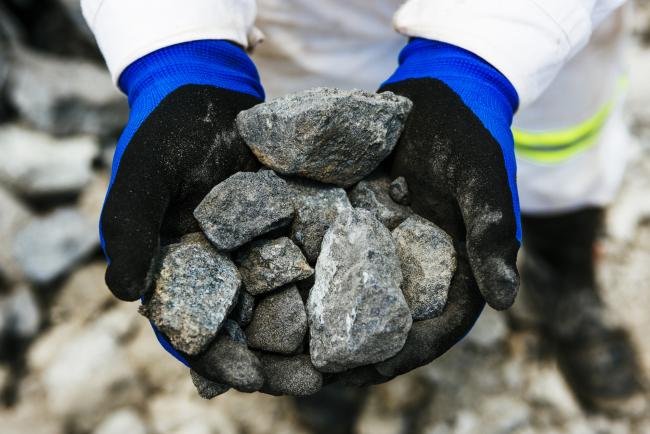(Bloomberg) -- The world’s biggest platinum producers face a dilemma: they’re reporting bumper profits just as they enter negotiations with labor unions over a three-year wage deal.
That surge in earnings has been fueled by higher prices for palladium and rhodium, which are mined alongside platinum in South Africa. Noting the buoyancy of the market, the Association of Mineworkers and Construction Union has asked for a pay increase of as much as 48%. Satisfying that demand will lead to job losses and mine closures, companies say.
“AMCU demands are ridiculous,” said Bernard Swanepoel, a former gold mine boss who now sits on the board of Impala Platinum Holdings Ltd. “Any increase above inflation will not serve the best interest of employees as jobs will be destroyed.”
The wage talks, which start in earnest next week, come as President Cyril Ramaphosa seeks to reset an economy teetering on the brink of a second recession in successive years. An amicable outcome will bolster the former mine union leader’s bid to lure foreign investors, while a repeat of a strike five years ago could send metal prices soaring and undermine Ramaphosa’s reform agenda.
“Society has no appetite or capacity to handle an industry strike,” said Swanepoel.
In 2014, AMCU led the longest ever platinum mining strike in the country, costing the sector about $2 billion in revenue. Now, it wants the roughly 167,000 workers in South Africa’s platinum mines to partake in the metal-price bonanza.
“We are really glad that it is going so well with platinum, and it is high time that the bosses share their hyper profits with the workers who toil every day,” President Joseph Mathunjwa said as the union presented its initial demand.
Good Times
Earlier this week, Anglo American (LON:AAL) Platinum Ltd. said it expects first-half net income to almost triple to at least 6.1 billion rand ($425 million). The company will respond to AMCU’s demands in due course, said spokeswoman Jana Marais.
Sibanye Gold Ltd., which became the world’s biggest platinum miner after its takeover of Lonmin Plc, acknowledged that higher prices have generated windfall profits, but said the wage demands are potentially damaging.
“We have recently had a good run, yes, but it doesn’t mean we have to give it all away in the first round of wage negotiations,” said James Wellsted, a spokesman for Sibanye. “That demand isn’t affordable and will result in closing of mines.”
Sibanye shares rose 0.9% as of 10:48 a.m. in Johannesburg, bringing this year’s gain to 65%. Impala declined 0.4%, while Amplats fell 1.8%.
Mining investors will be watching the negotiations closely as less than a year ago producers were closing shafts and cutting thousands of jobs as a stronger rand combined with stagnating metal prices to squeeze profit margins. In March, an industry lobby group said more than half the country’s platinum-group metals output was either marginal or unprofitable.
Risky Business
“These kind of wage demands will keep investors away,” said Ross Harvey, an independent economist. “The costs of doing business in South Africa remain too high, and the policy environment too risky, to warrant large sunk-cost investments.”
While its sister metals have surged, the price of platinum is trading near a decade low, leaving producers claiming they have little cushion to invest. Lonmin rebounded to profit in the six months through March, but only after four years of losses.
“These demands mean that there will be no money to reinvest, which is necessary for a sustainable industry,” said Wellsted.
Still, there are some causes for investor optimism. AMCU’s Mathunjwa has so far dispensed with most of his usual fiery rhetoric in favor of a more conciliatory tone. Moreover, three years ago, the union accepted a 12.5% wage increase for the lowest-paid workers after initially demanding 47%.
Much will depend on whether platinum miners toughen their stance in a bid to limit any wage deal to a single-digit increase, said Ben Davis, a mining analyst at Liberum Capital.
Settlement Possible
Northam Platinum Ltd. Chief Executive Officer Paul Dunne expects a “high single-digit increase” for the lowest-level employees.
“It’s going to be difficult, but I believe we can settle,” Dunne said in an interview on Wednesday. “It’s too early to opine whether there will be or won’t be a strike.”
While AMCU hasn’t ruled out industrial action, the union will be conscious that in April it was forced to call off a five-month strike at Sibanye’s gold mines with few gains to show for its members.
“It is difficult to see which side is going to back down first,” Davis said. “The companies’ stances may well have hardened and they will be less likely to meet in the middle. Ultimately, it will depend on whether AMCU can convince workers to dig their heels in and whip-up their emotions.”
